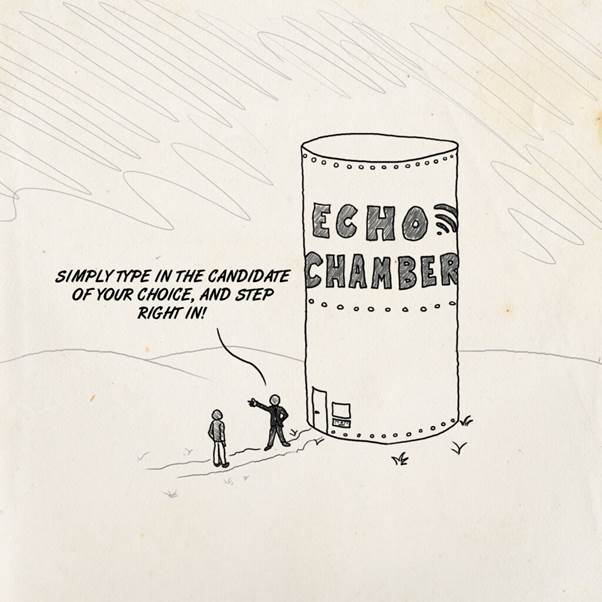Information that challenges our own views can make us uncomfortable. As a result, consciously or otherwise, we often go to great lengths to avoid exposure to such information. But maybe being driven to re-examine the evidence behind our beliefs and practices is a good thing – and something we need to make more time for.
Recently, I had an unusually long break from my normal routine (although, less than a month on, that break already feels pretty distant). This brought with it a little more free time than I’m used to. Like any vacuum, it seemed to be filled before I even realised it was there. Filled with food (a lot of food), family, friends, books, movies, conversation and food (cannot emphasise enough how much food there was). This is the sort of time you get to sit down and actually read the books you’ve been loaned, or recommended, watch the shows and movies someone mentioned to you that one time, or have the sort of conversations that go beyond the usual “after work catch up” with friends and family that normal life and routines allow for.
This is how I found myself feeling unusually challenged and frustrated. Don’t get me wrong, as a student being challenged and frustrated is part of the deal – but usually I’m challenged by a new task or idea; most often with enormous amounts of help and support from like-minded people around me. This was different. This was… difficult.
I found myself having conversations, reading books and watching shows where instead of basically agreeing with the main thrust of it all, I actively and passionately disagreed. If most of my challenging interactions in my normal day are like the puzzle where you have to get a fox, a chicken and a bag of corn across a river two at a time without anything being eaten, then this felt more like trying to get a few wolves across a river in a leaky boat after rolling around in steak juice. At the end of it, bloodied and bruised (or, at least, a little more frustrated than after a normal day), I wondered – why? Why did this keep happening?
In some ways this all made sense in the context of 2016. So many large-scale changes have happened (don’t make me say it…) over the past year, that the fact that people within the same country, culture and even family can have opinions of a wildly different nature and intensity has been brought into our awareness on a global scale. A day doesn’t go by without the sight of (metaphorical) teeth being bared almost everywhere you turn at the moment. Why wouldn’t this be reflected in daily life? Really it’s amazing that most of my days have gone by almost entirely sheltered on a personal level.
“Perhaps the reason I found my reading, watching and conversational material so challenging over the break was that it was banging on the door of my echo chamber”
This made me think about Laurie’s excellent piece about cognitive biases and their role in the recent rise of populist politicians. He speaks about how there’s lots of evidence to suggest that our brains tend to look for short cuts to more simply navigate the complicated world we find ourselves in, and that these can be exploited.
Specifically, it made me think about the idea of confirmation bias (or tending to pay more attention to information that reinforces what you already believe), and echo chambers.
We have all heard a lot about these over recent months. Most of the time in an effort to try to explain why so many people were taken by surprise when Britain voted to leave the EU, or Hillary was defeated in her bid to become the president of the USA, or to try to explain how people with diverse political leanings seem to be relying on completely different sets of ‘facts’ to support their arguments. Perhaps the reason I found my reading, watching and conversational material so challenging over the break was that it was banging on the door of my echo chamber.
Some things feel implicitly comfortable, and it is frightening to think that a careful examination of the evidence might make those comfortable beliefs collapse. This is true at many levels beyond the individual. I read a story told by a past president of the American Psychological Society (reproduced here) which culminates with his desire to pursue evidence-based treatment and prevention as a prime initiative during his tenure being rejected because “what if the evidence doesn’t come out in our favour?”.
Fortunately, few people would dispute the value of basing our psychological treatment and practice on a sound evidence base. Although this might not be entirely reflected systemically yet (there are still many threats to good, reproducible science – a good article talking about these is here), there is an increasing drive to put safeguards into place to try and be better at collecting and weighing evidence – whether it falls “in our favour” or not (good summaries of two recent papers about this can be found on the Neuroskeptic blog).
To bring this back to my story of the wolves on the boat – it made me consider that maybe this evidence based approach is also important on the personal level. It is not easy in science or in life to think that ideas we have held dear or that have driven our actions for a long time might not hold up to the strength of the evidence. It is, however, probably important to test them all the same. Although the value of evidence may vary, and weighing it seems to be getting increasingly more difficult in a world of “fake news”, being motivated to take a look outside of our echo chambers might help to at least make it a little less easy for our implicit biases to be exploited.


